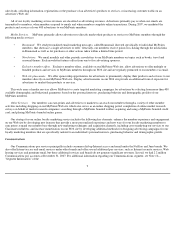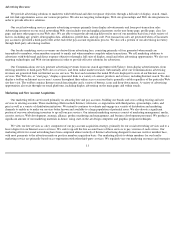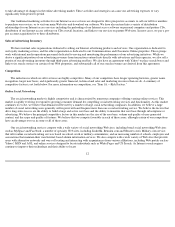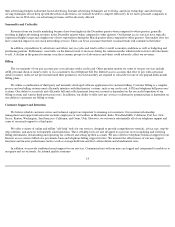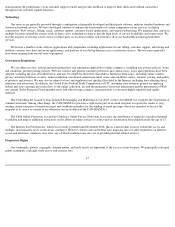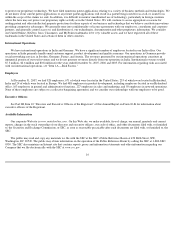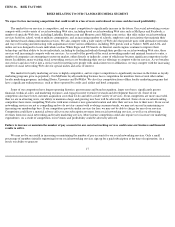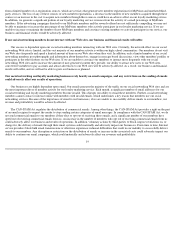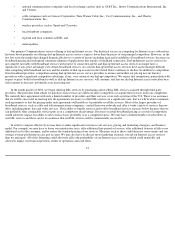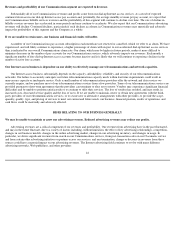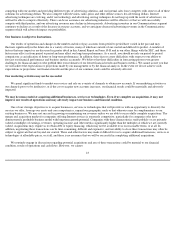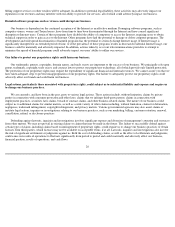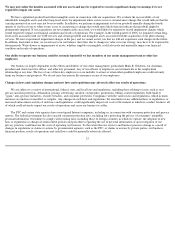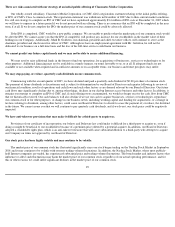Classmates.com 2007 Annual Report Download - page 21
Download and view the complete annual report
Please find page 21 of the 2007 Classmates.com annual report below. You can navigate through the pages in the report by either clicking on the pages listed below, or by using the keyword search tool below to find specific information within the annual report.
from a limited number of co-registration sources, which are services that generate new member registrations for MyPoints and unrelated third-
party services. The loss of any of these sources of new member registrations, a decrease in the number of new members acquired through these
sources or an increase in the cost to acquire new members through these sources could have an adverse affect on our loyalty marketing service.
In addition, we generate a significant portion of our loyalty marketing service revenues from the activity of a small percentage of MyPoints
members. If the advertising campaigns directed to our MyPoints members and the rewards offered are not sufficiently compelling, we may not
be able to maintain or increase the percentage of our MyPoints members who actively participate in our loyalty marketing service. If we are
unable to increase or maintain the number of new MyPoints members and convince existing members to actively participate in our service, our
business and financial results would be adversely affected.
If our social networking members do not interact with our Web sites, our business and financial results will suffer.
Our success is dependent upon our social networking members interacting with our Web sites. Currently, the network effect on our social
networking Web sites is limited, and the vast majority of our member activity is within our high school communities. Our members do not visit
our Web sites frequently and spend a limited amount of time on our Web sites when they visit. In addition, only a limited number of our social
networking members post photographs and information about themselves, engage in message board discussions, view other members' profiles or
participate in the other features on our Web sites. If we are unable to convince our members to interact more frequently with our social
networking Web sites and to increase the amount of user-generated content they provide, our ability to attract new users to our Web sites,
convert free members to pay accounts and attract advertisers to our Web sites will be adversely affected. As a result, our business and financial
results will suffer, and we will not be able to grow our business as planned.
Our social networking and loyalty marketing businesses rely heavily on email campaigns, and any restrictions on the sending of emails
could adversely affect our results of operations.
Our businesses are highly dependent upon email. Our emails generate the majority of the traffic on our social networking Web sites and are
the most important driver of member activity for our loyalty marketing service. Each month, a significant number of email addresses for our
social networking and loyalty marketing members become invalid. This disrupts our ability to email these members. Further, social networking
members cannot contact or interact online with members with invalid emails, which undermines a key reason that members use our social
networking services. Because of the importance of email to our businesses, if we are unable to successfully deliver emails to our members, our
revenue and profitability would be adversely affected.
The CAN-SPAM Act regulates the distribution of commercial emails. Among other things, the CAN-
SPAM Act provides a right on the part
of an email recipient to request the sender to stop sending certain categories of email messages. In compliance with the CAN-SPAM Act, we do
not send commercial emails to our members if they elect to opt out of receiving these emails, and a significant number of our members have
opted out of receiving commercial emails from us. An increase in the number of members who opt out of receiving commercial emails from us
could adversely affect our business and results of operations. In addition, voluntary actions by third-parties to block, impose restrictions on, or
charge for, the delivery of emails through their email systems could materially and adversely impact our businesses. From time to time, Internet
service providers block bulk email transmissions or otherwise experience technical difficulties that result in our inability to successfully deliver
emails to our members. Any disruption or restriction on the distribution of emails or increase in the associated costs could adversely impact our
ability to continue our email campaigns, which could materially and adversely affect our revenues and profitability.
19


